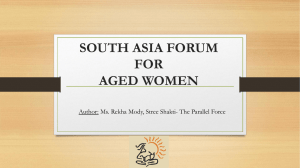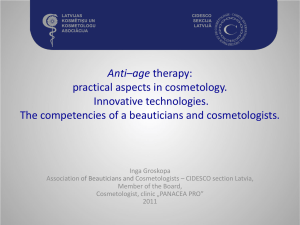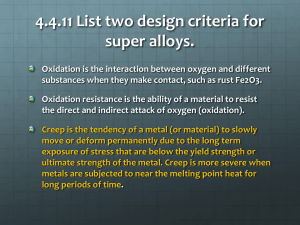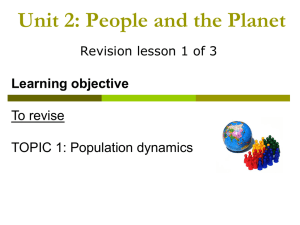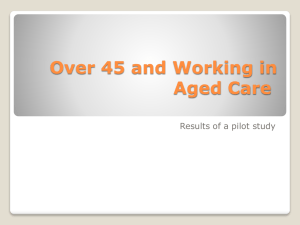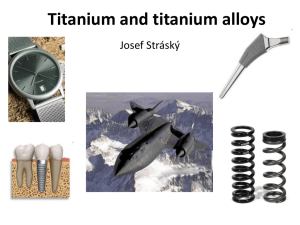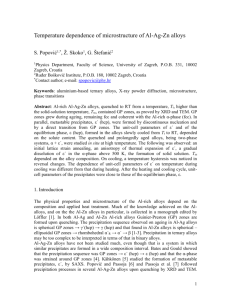Chapter 3 Heat treatment of Non
advertisement
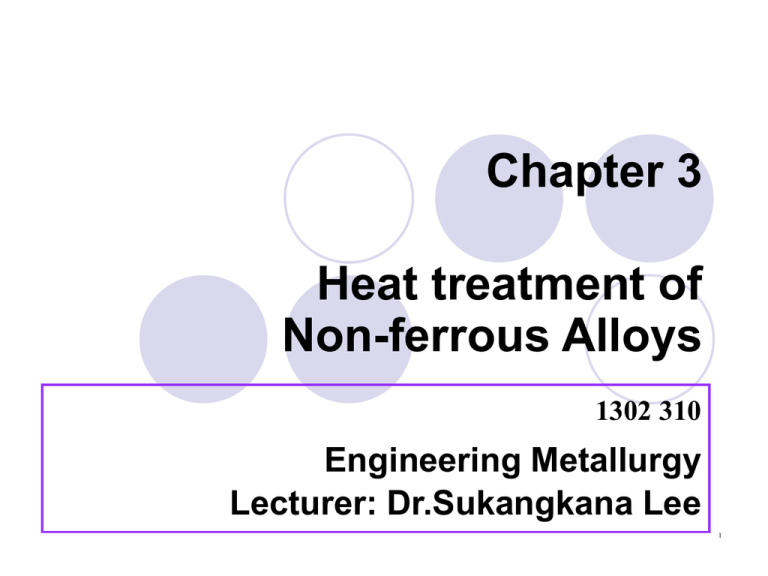
Chapter 3 Heat treatment of Non-ferrous Alloys 1302 310 Engineering Metallurgy Lecturer: Dr.Sukangkana Lee 1 1. Introduction Non-ferrous alloys are the important alloys used in the engineering applications. Only a small number are used in quantity as the basis for engineering materials, there are Aluminium, Copper, Magnesium, Nickel, Titanium, Zinc And many others are used as alloying elements or special purpose. 2 Alloys To be strengthen by forming solid solutions. To create alloys which will respond to strengthening heat treatments. To reduce melting temperatures and increase castability. To improve some other characteristic such as corrosion resistance. 3 Alloys Tensile Strength (MPa) Density (103 kgm-3) Tensile Strength / Density Relative Cost/Unit mass 1 Aluminium 100 to 550 2.7 37 to 200 3 Magnesium 150 to 350 1.8 110 to 190 0.5 Zinc 200 to 350 6.7 30 to 52 1 to 2 Copper 200 to 1300 8 25 to 160 5 Nickel 400 to 1300 8.9 47 to 146 25 Titanium 400 to 1600 4.5 89 to 356 4 Materials may have harden by 1. Strain hardening- when ductile metals are cold worked, this leads to increase of dislocation density and distorted lattice. If the cold working stops, the atom may diffuse again into a more stable form. This process called ‘Annealing’ and can be speed up by controlled heat treating procedure. (The effect of temperature on grain structure includes Recovery, Recrystallisation and Grain growth) 5 2. Solid solution hardening- the solute distorts the lattice and drag the dislocation movement 3. Precipitate hardening- fine particle distributed within grain or at grain boundary to prevent dislocation movement 6 The Fact: Many metals can be work hardened but can not be heat treated. Some alloys can only be formed by hot working or casting. Some alloys can be strengthened by precipitation hardening. 7 2. Solution heat treatment and age hardening Heat treatable alloy is subject to a two stage phenomenon 1. Solution Heat treatment 2. Ageing Natural Ageing Artificial Ageing 8 Slow Cooling Quenching T1 L SL T2 L L Alloy X 95%A 5%B %B 9 Temp. Quenching Artificial Ageing Time Strength and hardness T1 Supersaturated Solid Solution Peak Aged (Optimum size and distribution of precipitate for strengthening Supersaturated Solid solution Overaged (Coarsening of precipitate) Underaged (small and Underdeveloped precipitate) Ageing time at temperature 10 2.2 ตัวอย่างการทา Age-Hardening อลูมิเนี ยม-ทองแดง Equilibrium -phase (CuAl2) 11 Process Solution treating 540 C + 0 Artificial Ageing 180 C 0 1+GP Zones 2 + 3 + 4 + 12 GP Zones 13 14 3. Temper designation CODE: EC, F, O, H, T ใช้แทน ความหมาย เป็ นอลูมิเนี ยมที่มีความบริสทุ ธ์ 99.45% EC งานด้านไฟฟ้ า และมีธาตุผสม เช่น โบรอน และ ทองแดง เล็กน้ อย ชิ้นงานที่ไม่ผา่ นกรรมวิธีทางความร้อน สภาพเดิมของ ต่อเนื่ อง หรือ ทางกล เช่น งานหล่อ F การขึน้ รูป หมายถึง สภาพที่ได้ จากการหล่อ 15 ใช้แทน ความหมาย O สภาพการอบอ่อน เป็ นการอบคลาย ทาให้อ่อนด้วย การ (Annealed) สภาพการอบทาให้ เกิดผลึกใหม่ (Wrought product only) อบอ่อน หรือการอบทาให้เกิดผลึกใหม่ (Recrystallisation) ทาให้มีคณ ุ สมบัติ ด้านความอ่อน และเหนี ยว มักจะใช้กบั งานขึน้ รูปเย็น 16 ใช้แทน W สภาพไม่คงรูป ตามด้วยการ อบด้วยความ ร้อนของ สารละลาย ของแข็ง ความหมาย หมายถึง หลังจากทากรรมวิธี ให้ ความร้อน เพื่อให้เกิด การละลายตัว ของธาตุผสม ให้เป็ นเนื้ อเดียวกันกับ อลูมิเนี ยม (solid solution) จากนัน้ ทาให้เย็นตัว ลงอย่างรวดเร็ว เนื่ องจากโลหะชนิดนี้ มีการ เปลี่ยนแปลง (ทางโครงสร้าง) ตลอดเวลาที่ทิ้งไว้ในอากาศ ดังนัน้ จึง ต้อง ระบุเวลาหลังกรรมวิธี การให้ ความร้อน กากับไว้ด้วย 17 H ใช้กบั งานแปรรูปเย็น H ใช้แทน H1 ผ่านการทาให้แข็ง โดยการขึน้ รูปเย็น อย่างเดียว H2 ผ่านการทาให้แข็ง โดยการแปรรูปเย็น แล้วทาการอบคลาย H3 เพิ่มความแข็งโดยการ แปรรูปเย็น และ ทา ให้เสถียรภาพ ความหมาย เป็ นการผ่านการแปรรูปเย็นอย่างเดียว ตัวเลขตัวที่สอง จะแสดงความรุนแรงของการแปรรูป ในบางครัง้ อาจมี ตัวเลข ตัวที่สามบอกถึง การควบคุมการอบคลาย หรือ ระบุถึง คุณสมบัติทางกลพิเศษ ใช้กบั งานแปรรูปเย็นเพื่อต้องการเพิ่มความแข็งแรงของ วัสดุเกินกว่าระดับที่ต้องการเล็กน้ อย ต่อจากนัน้ จึงนาไป อบคลาย ความแข็งแรงจะถูกลดลงระดับหนึ่ ง ใช้กบั งานที่ผ่านการแปรรูปเย็นเพื่อเพิ่มความแข็งแรง จากนัน้ นาไปทากรรมวิธีทางความร้อน เพื่อให้โลหะคง รูป แต่ยงั มีความเค้นตกค้างในโลหะ ส่วนใหญ่ใช้กบั โลหะผสมที่มี แมกนี เซียมอยู่ด้วย 18 H เป็ นสัญลักษณ์ที่ใช้กบั งานที่ต้องการ เพิ่มคุณสมบัติ ทางกลให้สงู ขึน้ โดยการแปรรูปเย็น อาจจะมี กรรมวิธี ทางความร้อนควบคู่ และ H ต้องตามด้วยตัวเลขตัวเดียว หรือหลายตัว ซึ่งตัวเลขแสดงถึง การกาหนด ในการผลิต (Strain hardened) HXX ตัวเลขตัวที่ 2 จะมีตงั ้ แต่ 1 คืออ่อนที่สดุ ถึง 8 คือ แข็งที่สดุ (Full hardness: เป็ นการอบชุบที่ให้ค่า Ultimate Tensile Strength เท่ากับ 75% ของค่าที่ได้จากการขึน้ รูป เย็นภายหลังจากการทา Full annealing) เช่น 19 Strain hardened tempers (H) are followed by at least two digits. H x x Degree of strain hardening 2 4 6 8 9 1/4 hard 1/2 hard 3/4 hard fully hard extra hard Secondary treatment 1 Cold worked only (no anneal) 2 Cold worked + partial anneal 3 Cold worked + "stabilized" 20 H12 หมายความว่า เป็ นโลหะที่ผา่ นการทาให้แข็งโดยการ ขึน้ รูปเย็นอย่างเดียว และมีค่าความแข็ง 2/8 = ¼ Hard เรียกว่า a Quarter-hard และมีปริมาณการแปรรูปเย็น เท่ากับ ¼ x 75% = 18.75% H16 หมายความว่า เป็ นโลหะที่ผา่ นการทาให้แข็งโดยการ ขึน้ รูปเย็นอย่างเดียว และมีค่าความแข็ง 6/8 = ¾ Hard และมีปริมาณการแปรรูปเย็น เท่ากับ ¾ x 75% 56% 21 T เป็ นการปฏิ บ ตั ิ ก ารทางความร้ อ นเพื่ อ ให้ โ ลหะ เสถียรภาพ (precipitation hardened) ใช้กบั โลหะที่ ผ่าน กรรมวิธีทางความร้อน (Solution treatment and Ageing) ซึ่งอาจทาร่วมกับกรรมวิธีทางกลด้วยหรือไม่ก็ ได้ ใช้อกั ษรตัว T ตามด้วยเลข 2 ถึง 10 เป็ นข้อกาหนดของ การท างานเพื่ อ เปลี่ ย นสภาพของชิ้ น งานแตกต่ า งกัน ออกไป โดยการเติมตัวเลข ตัวเดียว หรือ หลายตัวก็ได้ 22 T1 T2 T3 T4 T5 Cooled from elevated temperature shaping process > Naturally aged to a substantially stable condition Cooled from elevated temperature shaping process > Cold worked > Naturally aged Solution heat treated > Cold worked > Naturally aged Solution heat treated > Naturally aged Cooled from high temperature shaping > Artificially aged 23 T6 T7 T8 T9 Solution heat treated > Artificially aged Solution heat treated > Overaged (i.e. beyond maximum strength) Solution heat treated > Cold worked > Artificially aged Solution heat treated > Artificially aged > Cold worked 24
